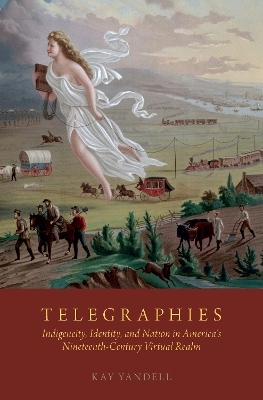
Telegraphies
Indigeneity, Identity, and Nation in America's Nineteenth-Century Virtual Realm
Seiten
2019
Oxford University Press Inc (Verlag)
978-0-19-090104-2 (ISBN)
Oxford University Press Inc (Verlag)
978-0-19-090104-2 (ISBN)
Telegraphies reveals a body of literature in which Americans of all ranks imagine how nineteenth-century telecommunications technologies forever alter the way Americans speak, write, form community, and conceive of the divine.
Telegraphies explores literatures envisioning the literary, societal, even the perceived metaphysical effects of various cultures' telecommunications technologies, to argue that nineteenth-century Americans tested in the virtual realm new theories of self, place, nation, and god. The book opens by discussing such Native American telecommunications technologies as smoke signals and sign language chains, to challenge common notions that long-distance speech practices emerged only in conjunction with capitalist industrialization. Kay Yandell analyzes the cultural interactions and literary productions that arose as Native telegraphs worked with and against European American telecommunications systems across nineteenth-century America. Into this conversation Telegraphies integrates visions of Morse's electromagnetic telegraph, with its claim to speak new, coded words and to send bodiless, textless prose instantly across the miles. Such writers as Frederick Douglass, Walt Whitman, and Ella Cheever Thayer crafted memoirs, poetic odes, and novels that envision how the birth of instantaneous communication across a vast continent forever alters the way Americans speak, write, build community, and conceive of the divine. While some writers celebrated far-speaking technologies as conduits of a metaphysical Manifest Destiny to overspread America's primitive cultures, others revealed how telecommunication could empower previously silenced voices to range free in the disembodied virtual realm, even as bodies remained confined by race, class, gender, disability, age, or geography. Ultimately, Telegraphies broadens the way literary scholars conceive of telecommunications technologies while providing a rich understanding of similarities between literatures often considered to have little in common.
Telegraphies explores literatures envisioning the literary, societal, even the perceived metaphysical effects of various cultures' telecommunications technologies, to argue that nineteenth-century Americans tested in the virtual realm new theories of self, place, nation, and god. The book opens by discussing such Native American telecommunications technologies as smoke signals and sign language chains, to challenge common notions that long-distance speech practices emerged only in conjunction with capitalist industrialization. Kay Yandell analyzes the cultural interactions and literary productions that arose as Native telegraphs worked with and against European American telecommunications systems across nineteenth-century America. Into this conversation Telegraphies integrates visions of Morse's electromagnetic telegraph, with its claim to speak new, coded words and to send bodiless, textless prose instantly across the miles. Such writers as Frederick Douglass, Walt Whitman, and Ella Cheever Thayer crafted memoirs, poetic odes, and novels that envision how the birth of instantaneous communication across a vast continent forever alters the way Americans speak, write, build community, and conceive of the divine. While some writers celebrated far-speaking technologies as conduits of a metaphysical Manifest Destiny to overspread America's primitive cultures, others revealed how telecommunication could empower previously silenced voices to range free in the disembodied virtual realm, even as bodies remained confined by race, class, gender, disability, age, or geography. Ultimately, Telegraphies broadens the way literary scholars conceive of telecommunications technologies while providing a rich understanding of similarities between literatures often considered to have little in common.
Kay Yandell is Assistant Professor of English at the University of Arkansas. She lives in Fayetteville, Arkansas with her husband and children.
Introduction: A Virtual Realm in Morse's Dot and Dash
Chapter 1: Moccasin Telegraph: Telecommunication Across Native America
Chapter 2: Crossing Border Wires: Telegraphers' Literatures and the State of American Union
Chapter 3: Corsets with Copper Wire: Victorian America's Cyborg Feminists
Chapter 4: Emily Dickinson's Telegrams from God
Chapter 5: Engineering Eden in Walt Whitman's "Passage to India"
Conclusion: Hawthorne's Celestial Telegraph and the Cycle of History
| Erscheinungsdatum | 19.12.2018 |
|---|---|
| Verlagsort | New York |
| Sprache | englisch |
| Maße | 163 x 239 mm |
| Gewicht | 476 g |
| Themenwelt | Geisteswissenschaften ► Sprach- / Literaturwissenschaft ► Anglistik / Amerikanistik |
| Geisteswissenschaften ► Sprach- / Literaturwissenschaft ► Literaturgeschichte | |
| Geisteswissenschaften ► Sprach- / Literaturwissenschaft ► Literaturwissenschaft | |
| Technik ► Nachrichtentechnik | |
| ISBN-10 | 0-19-090104-7 / 0190901047 |
| ISBN-13 | 978-0-19-090104-2 / 9780190901042 |
| Zustand | Neuware |
| Haben Sie eine Frage zum Produkt? |
Mehr entdecken
aus dem Bereich
aus dem Bereich
Poetik eines sozialen Urteils
Buch | Hardcover (2023)
De Gruyter (Verlag)
59,95 €
Buch | Softcover (2024)
belleville (Verlag)
20,00 €


